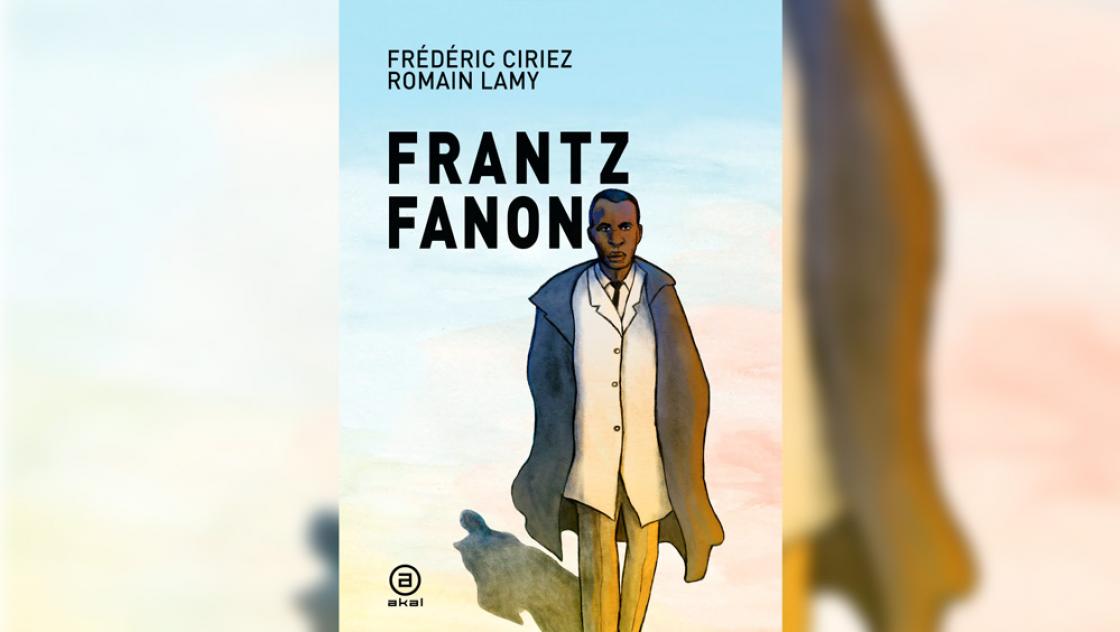November 24, 2021, 2:03 p.m.,
Redaktion der Blätter,
Allgemein.
Vergiftete Welten: Von Facebook zum »Metaverse«
Redaktion der …
24. November 2021 - 14:03
„Du setzt Deine Brille oder Dein Headset auf und befindest Dich sofort in Deinem digitalen Zuhause.“ Mit diesen Worten lüftete Mark Zuckerberg Ende Oktober den Vorhang zum Metaverse.
Quelle: https://www.blaetter.de/ausgabe/2021/dezember/vergiftete-welten-von-facebook-zum-metaverse
Kommentare geschlossen
November 24, 2021, 2:02 p.m.,
Redaktion der Blätter,
Allgemein.
Revolutionäres Denken in Aktion
Redaktion der …
24. November 2021 - 14:02

Bild:
Frédéric Ciriez und Romain Lamy, Frantz Fanon (Hamburger Edition)
Der Versuch mutet eigenwillig an: Zeit, Leben, Denken und Handeln eines Menschen in eine gezeichnete Geschichte zu packen, eine Graphic Novel. Hier ist er ein Glücksfall. Schon weil sein Subjekt Frantz Fanon – Psychiater, Philosoph, Poet, Diplomat, Revolutionär – so einzigartig ist.
Quelle: https://www.blaetter.de/ausgabe/2021/dezember/revolutionaeres-denken-in-aktion
Kommentare geschlossen
November 24, 2021, 2:01 p.m.,
Redaktion der Blätter,
Allgemein.
Chronik des Monats Oktober 2021
Redaktion der …
24. November 2021 - 14:01
1.10. – UNO. Im Sicherheitsrat scheitert die Verurteilung Nordkoreas wegen seiner umstrittenen Raketenversuche am Veto Chinas und Russlands. Ein entsprechender Resolutionsentwurf war von Frankreich und Großbritannien eingebracht worden.
Quelle: https://www.blaetter.de/ausgabe/2021/dezember/chronik-des-monats-oktober-2021
Kommentare geschlossen
November 24, 2021, 9:02 a.m.,
Boel Hackman,
Allgemein.
Kommentare geschlossen
November 23, 2021, 5:49 p.m.,
nAnne Klugern,
Beitrag.
Abstract
The evaluation and transformation process of the GDR research system in the wake of German reunification 1989/90 was immediately accompanied not only by debates within the scientific community, but also by an extensive discussion about the value and future perspectives of East German scholarship and its protagonists in the nationally circulated press. In 1990, the focus turned temporarily to the prominent East German prehistorian Joachim Herrmann after his election to the board of an international historical association. The article uses the example of Herrmann and the public discussion about him as a case study to examine the status of, and changes in, the authority of scholarship and the scholar in the context of the evaluation and restructuring of the East German research landscape in the early 1990s. A selection of press articles from nationwide German newspapers and newsmagazines, as well as archival letters exchanged between different participants in the debate serve as prisms carving out the central arguments and subjacent structures of the discussion. Therefore, Herrmann's case exposes generic characteristics of (different concepts of) scientific authority and the close connection between its negotiation and the search for identity in the newly reunited German academic sphere.
Quelle: https://onlinelibrary.wiley.com/doi/10.1002/bewi.202100009?af=R
Kommentare geschlossen
November 23, 2021, 5:48 p.m.,
nAndrea Petőn,
Beitrag.
Abstract
The emergence of illiberal science policy also raises serious questions about the European scientific authorization process as the rapid spread of illiberal science policies, such as closing accredited study programs and research institutions, privatizing higher education, appointing university leaders based on their loyalty to the government, ignoring quality assurance, etc. demand not only a reaction but also critical analysis. The article applies the theoretical framework of the polypore state (Grzebalska, Pető) to tackle the difficulty lies in understanding the rise of illiberal science policy in Hungary, as it is a twofold case study in both polypore government control/state capture, and neoliberal marketization of higher education.
Quelle: https://onlinelibrary.wiley.com/doi/10.1002/bewi.202100013?af=R
Kommentare geschlossen
November 23, 2021, 1:24 p.m.,
nFriedrich Cainn,
Beitrag.
Abstract
This essay studies the narrative self-positioning of Science Studies in the German Democratic Republic during the 1980s. Drawing on archival material on the foundation of the Council for Marxist-Leninist Science Studies at the Academy of Sciences in East Berlin in March 1988, it analyses how boundaries between Science Studies as a lone standing discipline and several other fields were construed and crossed at the same time and how (scientific) authority was claimed from the intermediate position of an external insider. Not only did Science Studies engage with their subject – the sciences –, but also with the politics of the Socialist Party, with the institution of the Academy, and with (industrial) production. After a formative institutional phase that spanned across the 1970s, Science Studies made efforts to centralize their work during the 1980s, to bind themselves closer to the state and scientific institutions, and to distinguish themselves from them at the same time.
Quelle: https://onlinelibrary.wiley.com/doi/10.1002/bewi.202100017?af=R
Kommentare geschlossen
November 22, 2021, 10:43 a.m.,
Elisabeth L. Engebretsen,
Allgemein.
Kommentare geschlossen
November 22, 2021, 9:51 a.m.,
Catherine Renshaw,
Allgemein.
Kommentare geschlossen
November 22, 2021, 9:05 a.m.,
Joyce Marie Mushaben,
Allgemein.
Kommentare geschlossen

